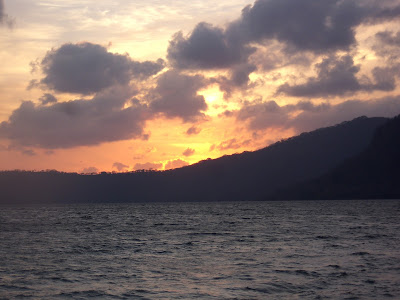As the largest volcanic crater lake in
Nicaragua,
Laguna de Apoyo has a lot to see. There are lots of angles and facets, and the perspective changes from hour to hour. Here are a few photos shared by our friends to give you an idea of the different ways people see the lake.
 |
| Sunrise is a great moment to be on the lake. Vera Neumann |
Usually at dawn, the lake is relatively quiet. During the rainy season, that may mean the volcanic crater lake is so smooth as to reflect the mountains on the opposite side. During the dry season, when winds blow constantly, the lake is just less choppy at dawn, whereas real waves may kick up during the day, as strong gusts build. Throughout the day, constantly changing, the
water is never the same.
 |
| Lake Apoyo may show patches of different colors, when viewed from above, as in this photo taken from Catarina. Ad Konings. |
Because
Laguna de Apoyo is extremely deep, reaching 178 meters depth, masses of water with different flow patterns may occur. And, of course, there are
fish down there, interesting ones. At all times, the lake is a beautiful blue, but the shades of blue may vary in the patches and may also be muted by whitecaps during the strong winds of the dry season, from December through April.
 |
| Sometimes views of the lake are sharp and clear, and other times there may be clouds or haze, but the view is always worth a smile. Jessica Lopez. |
The forests surrounding the lake serve some very important environmental functions. The first is that the trees sustain the loose, volcanic ash-laden soils on the steep slopes surrounding the lake. Apoyo is a volcanic crater some 23,000 years old, with the water table emerging through the bottom of the crater. The interior sides of the crater are rapidly eroding. in areas where houses have been built or the
land has been deforested for whatever reason. In some places where the trees have been cut, the land has given way in dramatic landslides.
Another important function of the forest is to retain the water in the ground. When the sun and wind reach the soils, as in deforested areas, the ground dries and compacts, drawing water out of the water table below and reducing the capacity of the soils to recharge water into the water table during precipitation.
The
forests of
Laguna de Apoyo Nature Reserve are also very important habitat for a wide variety of terrestrial mammals, most notably two species of monkeys and over 225 species of birds. Although the forests of Apoyo are not extensive, they are contiguous with forests of Mombacho and Volcano Masaya, linking a corridor which together makes an important contribution to the biodiversity of the region.
 |
| Any visit to Laguna de Apoyo must include swimming. Photo Lucy Lia Real. |
The best part of the lake for us bipeds is that the
water is warm, clean, and inviting. We get into the lake to feel what only being in a natural water body can bring, a sense of renewal. It is no surprise that religions often use water in spiritual renewal rites.
Laguna de Apoyo will inspire the most spiritual aspects of anyone, particularly when one gets away from the handful of
tourist traps near the entrance.
 |
| Stormy weather can be dramatic in Laguna de Apoyo, worth seeing at a safe distance. Photo Jen Moran. |
GAIA is dedicated to keeping
Laguna de Apoyo pristine, through working with scientists, tourists and locals to make the best choices for development in the area of the lake. We coordinated with another NGO, CLUSA to develop the management plan now in place in
Laguna de Apoyo Nature Reserve, in which our personnel were deeply involved in the community involvement in all the negotiations.
GAIA scientists have discovered
five species of fish in
Laguna de Apoyo, all of which are only found in this lake.
 |
| A serene moment at Laguna de Apoyo calls for yoga. Photo Jen Moran. |
Laguna de Apoyo deserves your involvement and needs you to help ensure the lake is never destroyed, so that humans and wild nature can find harmony. Please
contact us if you would like to join us. We want to year from you.
 |
| Loving Laguna de Apoyo means leaving only a shadow behind. Catherine Bard-Dechesnau |








No comments:
Post a Comment